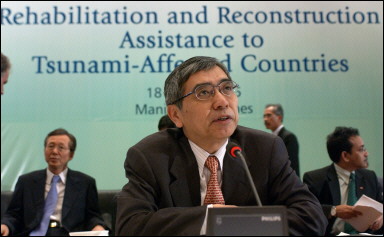|
Funding shortfall of US$5.25b for tsunami reconstruction
(Agencies)
Updated: 2005-03-18 14:43
The cost of rehabilitation and reconstruction in four of the worse affected countries by the tsunami disaster is short by 5.25 billion dollars, the Asian Development Bank (ADB) said.
According to ADB data some 7.764 billion dollars will be needed by India, Indonesia, Maldives and Sri Lanka for rehabilitation and reconstruction.
So far only 2.51 billion has been committed leaving a funding gap of some 5.25 billion dollars.

Asian Development Bank president Haruhiko Kuroda delivers his address at the ADB tsunami relief conference in Manila. The cost of rehabilitation and reconstruction in four of the countries worst affected by the tsunami disaster is short by 5.25 billion dollars, the bank said. [AFP] |
The data is contained in a 'Tsunami Recovery Tracking Matrix' which was presented Friday at a one-day international conference organized by the ADB at its Manila headquarters.
Those attending the conference included: ministers from India, Thailand, Indonesia, Maldives, Sir Lanka; representatives from 28 ADB member countries; United Nations agencies; the World Bank; International Monetary Fund, Islamic Development Bank, the private sector and non-government organizations (NGOs.)
A spokesman for the ADB said the matrix "is not definitive."
"There are still a lot of gaps that need to be filled in but it is a start.
"It is hoped it will be used as a fundamental planning tool for donors, affected countries, NGOs and the like to get a broad view of what is needed, where the aid is needed and how much will it cost."
According to the ADB's figures the cost for rehabilitation and reconstruction in affected parts of India is estimated at 1.212 billion dollars of which 791.3 million has been committed.
Indonesia will need 4.722 billion dollars of which 670.5 million has been committed; Maldives will need 406.3 million dollars with 187.2 committed and Sri Lanka 1.42 billion needed and 863.8 million dollars so far committed.
Thailand was not included in the matrix as "it has not sought international assistance for rehabilitation or reconstruction needs," according to the ADB.
ADB president Haruhiko Kuroda said at the opening of the conference that the distribution of the billions of dollars pledged for rehabilitation and reconstruction must be "predictable, transparent, strategic and effective."
"As the recovery effort now moves from initial relief to rehabilitation and reconstruction, it is essential to keep the world's attention focused on continued support and ensure that donor confidence in our efforts remains high," he said.
He told the conference that in India almost 700 kilometers (434 miles) of roads were damaged.
In Indonesia's Aceh Province the livelihoods of 44 percent of the population are affected while in Sri Lanka, 100,000 homes were destroyed and 65 percent of the country's fishing fleet damaged or lost.
"These are just a few examples of the tsunami's massive footprint," he said.
"Clearly, the rehabilitation and reconstruction needs across all sectors must be addressed in order to meet this huge challenge.
"Lessons learned from other large-scale disasters highlight the importance of establishing priorities and doing things in the right order.
"The ongoing recovery work must be coordinated at the country level, and countries must have full ownership of the recovery efforts," he said.
More than 270,000 people are believed to have perished last December when a powerful earthquake off the east coast of Sumatra set in motion a massive tsunami which devastated Banda Aceh in Indonesia's northern Aceh province and coastal resort areas in Thailand, Maldives, India and Sri Lanka.
|